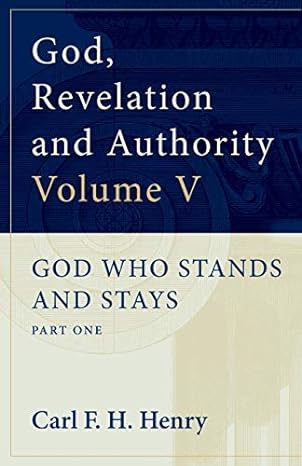A Brief Book Summary from Books At a Glance
by Steve West
About the Author
Carl F. H. Henry was one of the key thinkers and theologians of the evangelical movement in the 20th Century. God, Revelation and Authority is a seminal, multi-volume work of theological and philosophical engagement that has influenced and shaped evangelical thought for decades.
Table of Contents
Introduction: God Who Stands and Stays
1. The Reality and Objectivity of God
2. The Being and Coming and Becoming of God
3. The Living God of the Bible
4. Methods of Determining the Divine Attributes
5. Relationship of Essence and Attributes
6. God’s Divine Simplicity and Attributes
7. Personality in the Godhead
Supplementary Note: The Feminist Challenge to God-Language
8. Muddling the Trinitarian Dispute
9. The Doctrine of the Trinity
10. God the Ultimate Spirit
11. God the Self-Revealed Infinite
12. Divine Timelessness or Unlimited Duration?
13. The Modern Attack on the Timeless God
14. Divine Timelessness and Divine Omniscience
15. The Unchanging, Immutable God
Supplementary Note: Anthropomorphism and Divine Repentance
16. The Sovereignty of the Omnipotent God
Supplementary Note: Sovereignty and Personality
17. God’s Intellectual Attributes
18. Shadows of the Irrational
19. The Knowability of God
20. Man’s Mind and God’s Mind
21. Reflections on the Revelation-and-Culture Debate
Summary
From the Introduction: “God who is, we shall contend, is God who stands, and stays. God who independently ‘stands’ is the personal sovereign containing in himself the ground of his own existence; God who ‘stays’ governs in providence and in eschatological consummation of his dramatic plan for man and the world.”
Chapters 1-3
God is the God who is. He is an eternal, objective being, who is self-existent, non-contingent, and living. Although they approach the subject from different angles, both logical positivists and existentialists set aside the objective being and knowledge of God. Many theologians turned away from objective knowledge of God, arguing that since God is a personal subject, our knowledge of him is personal and subjective. Yet personal relationships do not destroy the subject-object aspect of knowledge. If religion is not in contact with objective realities, then faith is destroyed: “Authentic faith has God’s external, objective existence as its presupposition.” Christian faith brings objective elements together with trust; the gospel calls people to respond to objective reality. If God is not objectively real, then faith is eviscerated. Scientism is self-refuting, as was positivism. Theology does not have an identical method to science, but that does not mean it cannot have objective knowledge (or that science is screened from subjective sensory data and interpretation). Detached from objective reality and the existence of God, human rights and social revolution cannot have any foundation. God exists, and we must know who he is. We must know what God is. God is the God who is; it is this is-ness that grounds the intelligibility of our faith.
The Bible begins by establishing God as the transcendent creator and sustainer of the universe. Greek philosophers proposed numerous theories about the relationship between being and becoming, and much of their thinking influenced Western theologians and philosophers in history. Relating the temporal and eternal, the mutable and immutable, has been impossible outside of biblical revelation. The Bible speaks of being and becoming in its own way, and those who ignore it end up mired in contradiction. God comes to us in revelation; it is through revelation that we know what we can say about him. Biblically, the coming of God means that he establishes personal relationships between himself and creation. He comes voluntarily and sovereignly. He comes in the Messiah, the Spirit, and eschatologically. Secular visions of utopia may forecast an evolutionary becoming, but Christian eschatology sees the kingdom coming. A sound biblical perspective must deal with God being, coming, and becoming. The only biblical becoming for God is when the Word takes on human flesh. God’s Word became flesh, and thus it is the incarnation that links God’s being, coming, and becoming. God’s divine nature did not change, but a human nature was assumed by the Logos. Christ takes on human flesh to reveal and exegete for us the unchanging nature of God. There is never an ontological change in God.
That the Lord lives is simultaneously simple and profound. Unlike everything else, God has life in himself. There is only one God in the universe, and he is transcendent, preexistent, eternal, independent, and necessary. The kind of life that man enjoys is infinitely below the fullness of life had by God. In contrast, false gods have no life; they are zeroes. There are not two equal eternal forces—one good and one evil—but rather finite evil spirits in opposition to God. These forces cannot defeat God’s sovereign purposes, nor separate us from God’s love in Christ. Today, many deny the reality of the supernatural realm, but they still worship novelty, idols, and themselves. It is through divine revelation and the Spirit that we can distinguish the true God from all pretenders. Death is the opposite of life, and death is conquered by Christ. Even now we have eternal life in him, and look forward to glorification and living with him forever. . . .
[To continue reading this summary, please see below....]The remainder of this article is premium content. Become a member to continue reading.
Already have an account? Sign In
